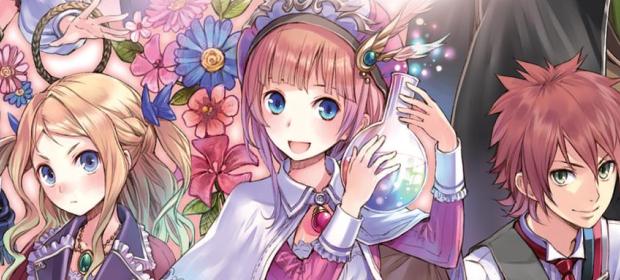To many Western gamers – particularly those more interested in the big mainstream titles – I imagine the Atelier series might come across as something of a curio. Even among other JRPGs, they’re fairly sedate, focusing on gathering and crafting as opposed to combat and adventuring.
Atelier Rorona Plus: The Alchemist of Arland is a re-vamped version of the eleventh title in the series, and is one of the more “traditional” games in terms of combat and characterisation. It focuses on the titular Rorona, a young apprentice alchemist thrust into a position of pressure and responsibility and tasked with twelve assignments over the course of three years. Like many games in the series, the mission structure is built around these assignments, and a persistent clock shreds days off your calendar with every journey you undertake or concoction you create.
After finding herself in charge of her master’s atelier, Rorona is told that she has three years to save the shop, and that she can do it by performing jobs for the Palace. Her primary contact is surly knight, Sterkenburg, but she also has other friends she can call on such as the snooty, mean-spirited Cordelia or weak-wristed shopkeeper Iksel. Each job entails gathering reagents and crafting particular items, then turning them into Sterk before the term ends.
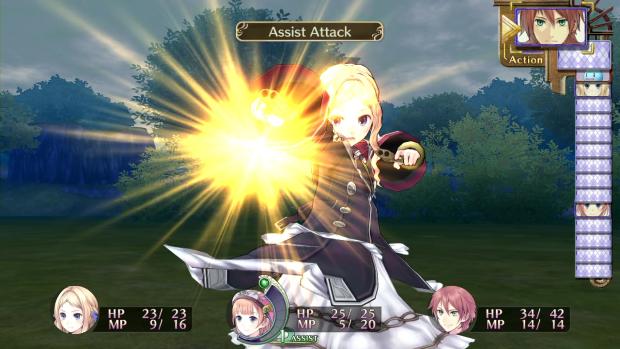
Initially, it’s quite easy, and you’ll often complete objectives early and then have time to go and farm reagents with which to make combat items, curatives and weapon upgrades. All travel between areas is instantaneous, so going from the central hub town into a nearby forest or a creepy old ruin will cost you little more than a few button presses and a couple of days off your deadline.
Recipes are found in books or given to you by NPCs, but all ingredients are harvested from the field, whether taken from fallen enemies or gathered from the environment. Once you’ve found a new gathering area, you can fast travel to and from it as much as you like. The majority of monsters can be avoided, but some will block the way to needed ingredients or new areas and you’ll have to deal with them. Luckily, the turn-based combat is quite enjoyable.
Rorona can take two allies out into the field with her by hiring them and paying their fees daily. Each character comes with their own combat style and special skills, which is really as deep as it gets. When Rorona uses a skill attack, pressing a trigger will activate a support move from whichever ally is mapped to that trigger, causing them to perform a follow-up attack for increased damage. Likewise, many attacks can be mitigated by her team-mates leaping into harm’s way to protect her. The combat is serviceable and quite fun, and some of the special skills are impressive while not particularly dazzling. Failure will see you returned to the town, and force you to either use up precious curatives or waste vital days resting on Rorona’s couch.
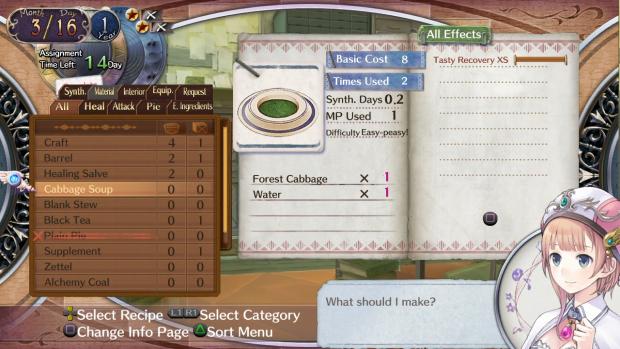
Once you go back, using the atelier is easy. A journal allows you to save your progress, decorate the shop by adding useful items like containers, alter Rorona’s clothing, or change the background music. Approaching the cauldron will bring up a menu of concoctions, with the ones you can’t make helpfully crossed off. You’ll then select what you want to make and use the best ingredients to achieve the best results. For example, some things like explosives can be crafted from many different ingredients. Selecting the ones that will add damage or other effects is always preferable, and you can often add a bonus to a created item such as an increased trading price or improved damage to enemies.
The balance between crafting and gathering is spot on, and finding that you’re a few ingredients short prompts nothing more than a return trip to a specific area and a spot of foraging. Side missions are completed as you play, rewarding you for, say, using ten healing salves on other characters or gathering a certain number of ingredients. Additionally, the knight at the Palace’s front desk will give you contracts from NPCs who want certain things made and will pay for the service.
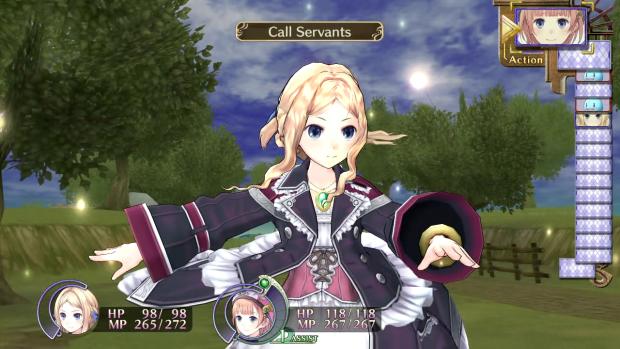
Compared to some of the other games I’ve played in the Atelier series, Rorona Plus’ characters aren’t particularly irritating. It still suffers from the almost atypical JRPG characterisation issues such as immature dialogue and a wildly inconsistent tone, but the storyline is decent enough and the voice acting isn’t as annoying as I found it to be in Atelier Escha & Logy. Most of the characters follow a certain archetype, which is almost expected: Rorona is the naive young girl thrust in over her head; Sterk is broody and foreboding, channelling Robert Pattinson while all the female characters swoon around him; Cordelia is horribly insensitive but hides a heart of gold, and so on. It’s mostly par for the course, but there are flashes of humour that stop it all from becoming too po-faced.
Notably, the subplot involving Rorona’s father, Ryan, and his apparent obsession with a beautiful widow in town is amusing, while Rorona’s master is a creepy, over-sexed predator who constantly flirts with her pupil, invites her to join her in bed and apologises for “what she did to you last night while you were sleeping”. It’s horribly creepy at times, and the fact that Rorona’s master is female makes it no less worrying. Some of it may be down to localisation losing the initial subtlety, but it can be weird.
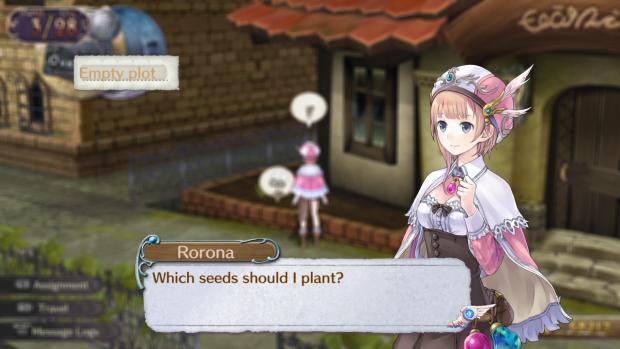
The biggest change between the original release and Rorona Plus is the visual style. Characters are less cartoony, particularly in battle, and the whole aesthetic is more in line with Atelier Ayesha and Escha & Logy. A slightly washed-out, pastel-coloured palette adds a fairytale quality to the visuals, and the character models are well detailed. The music can begin to grate after a while, but the voice acting is decent – although not all the dialogue is spoken, even in dedicated dialogue scenes.
VERDICT: Atelier Rorona Plus: The Alchemist of Arland is an enjoyable adventure let down by its repetitive nature and the increasing constraints imposed by the time limit. While the initial few assignments are quite straightforward, the harder they get the further you have to travel, and the more you have to gather, and before long you’ll be wishing for an open-world JRPG without restrictions. That said, likeable characters and a more traditional approach to turn-based combat are welcome, and the improved aesthetic feels more in keeping with the recent additions to the franchise. Rorona Plus is not an instant classic, but accessible and enjoyable enough that it deserves to be more than just a curio.

GOOD. A game that scores 7/10 is worthy of note, but unworthy of fanfare. It does many things well, but only a few of them incredibly well and, despite a handful of good qualities, fresh ideas and solid mechanics, it fails to overwhelm.
Review code provided by publisher.


